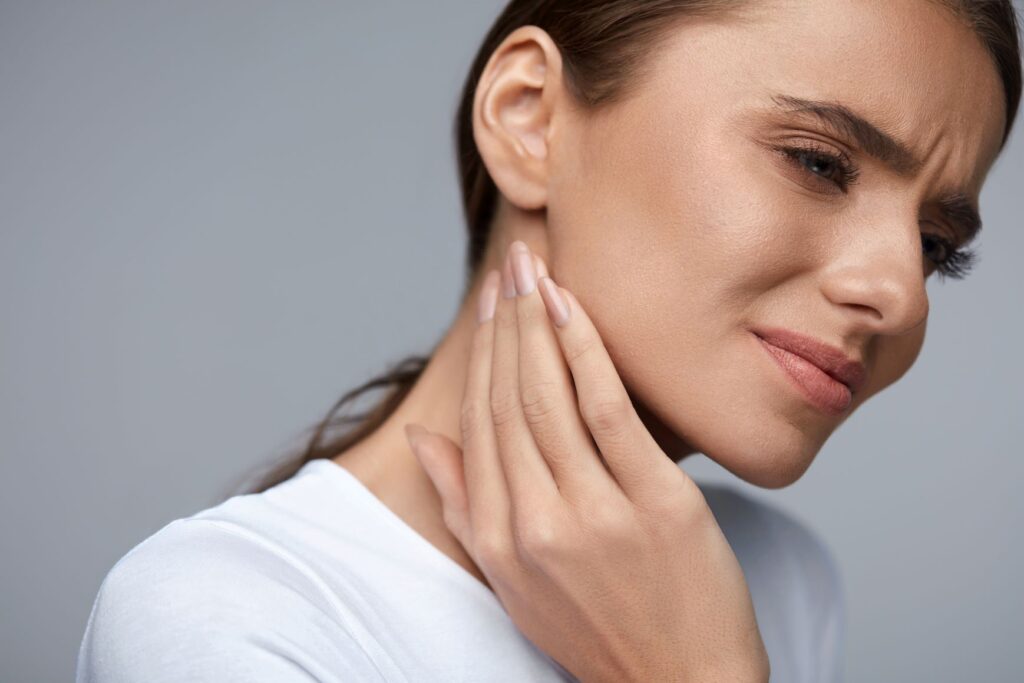
Popping and clicking sounds might be no big deal when it comes to your favorite cereal, but what happens when you start hearing them when you open or close your jaw? While not all of these kinds of sounds are cause for concern, it’s important to pay attention to any changes in your body, especially if they’re accompanied by pain. If you’re noticing any unusual sounds emanating from your jaw, here are some concepts to keep in mind and next steps you can take.
The Two Types of Jaw Sounds
When it comes to the noises our jaws make, there are two main types: when you open it to its widest, and when it closes. The first is a completely normal subluxation (when a joint becomes misaligned) that occurs when you hyperextend your lower jaw and the lower jawbone passes over a ridge in the upper jawbone, like when you’re yawning.
The second occurs when you are closing your mouth and the cartilage-like disc in the jaw’s joint slips forward, ahead of the lower jawbone. It will also pop again when you go to reopen your mouth as it tries to regain its position on the lower condyle (the rounded of the lower jaw that connects to the temporomandibular joint on both sides of the skull). When this happens, it can be the sign of a bigger problem.
Reasons Your Jaw Makes Noise
If your jaw is making noise when you close your mouth, there are several possible reasons why, including:
- Arthritis
- A broken jaw
- Malocclusion (misalignment of the teeth)
- Myofascial pain syndrome
- Sleep apnea
- Infection
- Tumor
When this type of disorder occurs, it is known as a temporomandibular joint disorder, or a TMJ disorder. TMJ disorders can be genetic or caused by an injury or other condition. They are often accompanied by other symptoms, such as:
- Tinnitus (ringing of the ears)
- Migraine headaches
- Jaw pain
- Difficulty opening and closing the mouth to speak or chew
- Neck, shoulder, or back pain
- Poor posture
If you notice any of these symptoms in conjunction with a popping and clicking sound when you open or close your mouth, schedule a consultation with your dentist to be evaluated for TMJ disorder.
What is the Treatment for TMJ Disorder?
When it comes to TMJ disorder, there’s no one-size-fits-all treatment. Yours will depend on what is causing your TMJ disorder. For example, you may be recommended braces if your symptoms are caused by malocclusion or be referred to a rheumatologist to help with arthritis.
You can also find temporary relief from TMJ symptoms by applying warm compresses to the jaw, taking over-the-counter pain reliever, or even by seeing a physical therapist to learn jaw exercises to help combat stiffness and improve comfort.
If your jaw is hurting or it’s making any unusual sounds, make an appointment with your dentist to be evaluated for TMJ disorder. Getting a proper diagnosis can help you get to the root of the problem and help get your jaw back in its proper alignment.
About Dr. Fedosky
Dr. Keane Fedosky and the team at Sleep Rehab devote their focus to treating patients suffering from sleep apnea and TMJ disorders. Dr. Fedosky has 20 years of experience in oral appliance therapy and is a member of the American Academy of Dental Sleep Medicine, the American Dental Association, the Texas Dental Association, and the American Academy of Craniofacial Pain.
To have your jaw evaluated, please schedule an appointment by visiting our website or by calling us at 972-544-0550.
